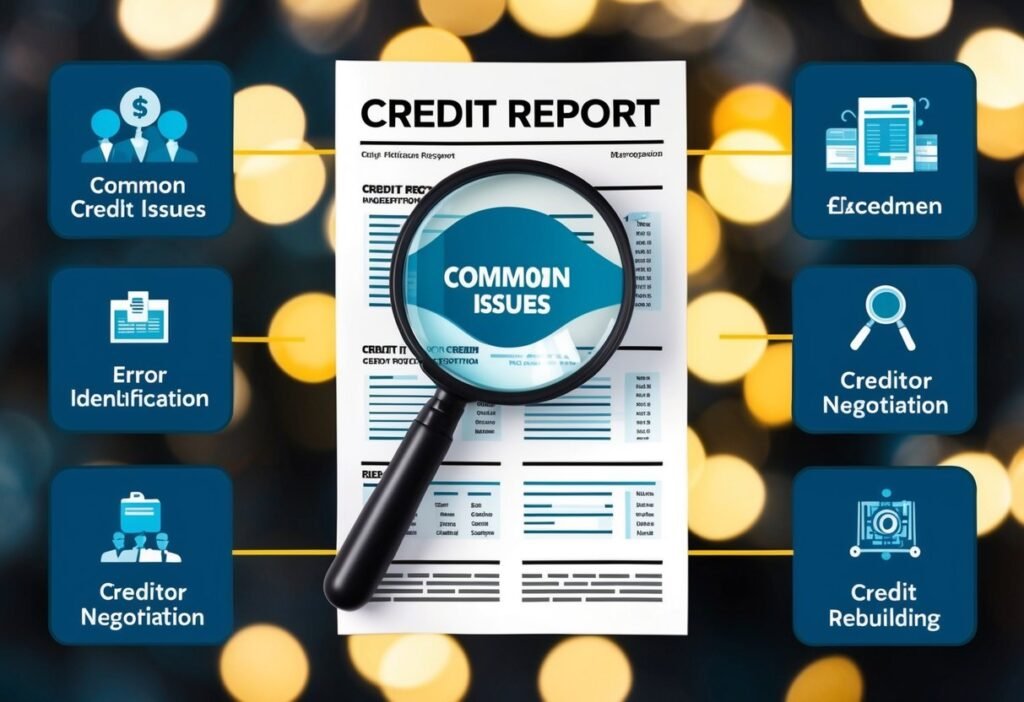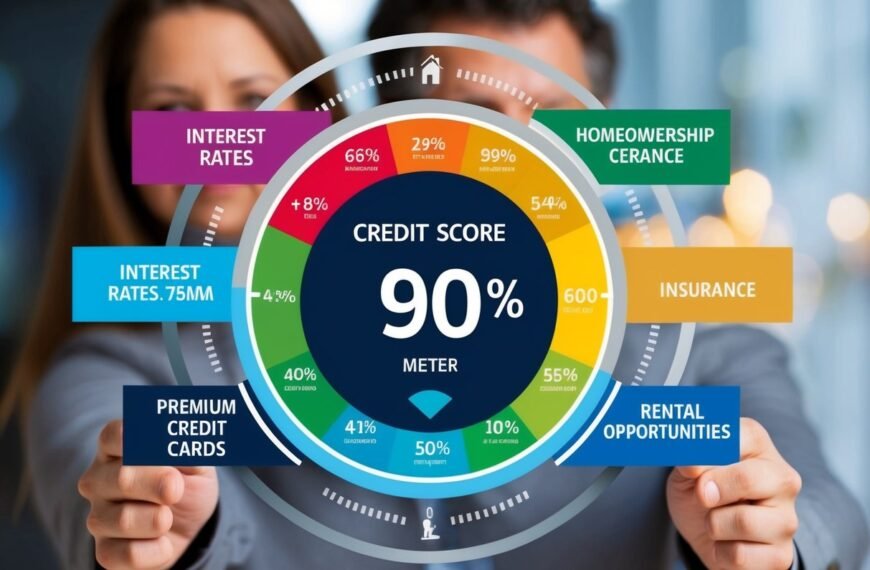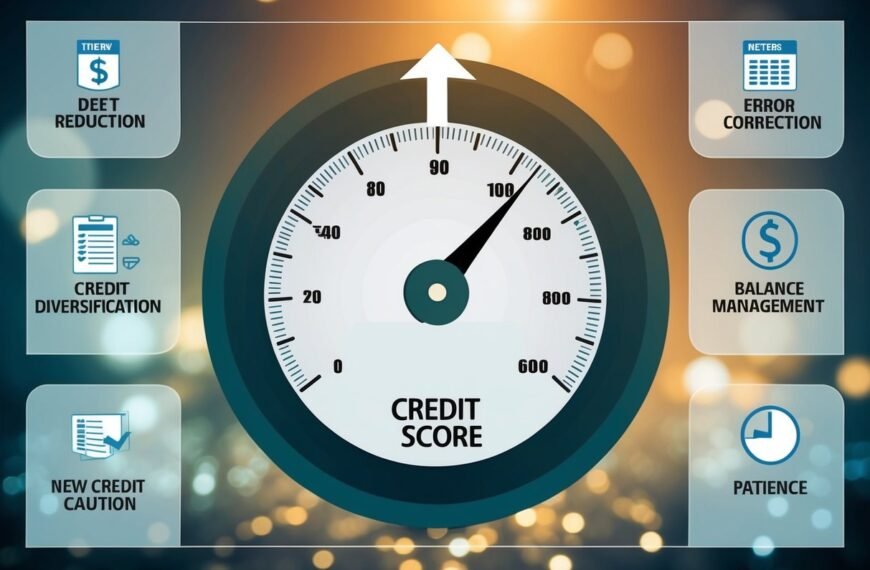
Explore the earlier installment of this series in Part 4-Building a Solid Credit History to build a comprehensive understanding before delving into this chapter.
In this chapter, you will gain valuable insights into how to address and overcome credit issues that may be affecting your financial standing. This article covers a wide range of topics, from the impact of negative marks on your credit to strategies for rebuilding it. You will learn how to identify errors and inaccuracies in your credit report, negotiate with creditors, and even when to consider seeking professional help. By the end, you will have a clear understanding of the steps you can take to improve your credit and pave the path to a more secure financial future. So let’s dive in and explore the world of credit issues and their solutions together.
The Impact of Negative Marks on Credit
When it comes to your financial well-being, one thing that can have a significant impact is your credit. Your credit score is a reflection of your creditworthiness and is used by lenders, landlords, and even potential employers to determine your trustworthiness and financial stability. Unfortunately, negative marks on your credit can have serious consequences and can make it difficult for you to obtain credit in the future. In this article, we will explore the impact of negative marks on credit and discuss why addressing credit issues is crucial for your financial health.
Why Addressing Credit Issues Is Crucial
Addressing credit issues is crucial because negative marks on your credit can have long-lasting effects. Not only do they lower your credit score, but they can also make it difficult to get approved for loans, credit cards, and even rental agreements. Negative marks such as late payments, defaults on loans, and collections can stay on your credit report for up to seven years, and bankruptcies can stay on your report for up to ten years. This means that even a single mistake can impact your creditworthiness for a significant amount of time. By addressing credit issues head-on, you can work towards improving your credit and securing a brighter financial future.
Common Credit Issues
Understanding Late Payments
Late payments are one of the most common credit issues that individuals face. Whether it’s due to forgetfulness, financial hardships, or simply mismanagement, late payments can have a detrimental effect on your credit score. When you make a payment past its due date, it is typically reported to the credit bureaus and will be noted on your credit report. This can lower your credit score and signal to lenders that you may not be reliable when it comes to meeting your financial obligations.
The Consequences of Defaulting on Loans
Defaulting on loans is another credit issue that can have serious consequences. When you default on a loan, it means that you have failed to make your required payments for an extended period of time. This can result in the lender taking legal action against you, which can further damage your credit. Additionally, defaulting on loans can result in the repossession of assets, such as a car or a house, which can have a significant impact on your financial stability.
The Impact of Collections and Charge-Offs
Collections and charge-offs are negative marks that occur when a creditor gives up on trying to collect a debt and reports it as unpaid. Collections can occur when a creditor hires a third-party agency to collect on the debt, while charge-offs are typically the result of the creditor writing off the debt as a loss. Both collections and charge-offs are extremely detrimental to your credit score and can make it difficult to obtain credit in the future.
Identifying Errors and Inaccuracies
The Importance of Regularly Reviewing Your Credit Report
Regularly reviewing your credit report is crucial because it allows you to identify any errors or inaccuracies that may be negatively impacting your credit. By obtaining a copy of your credit report from each of the three major credit bureaus – Experian, TransUnion, and Equifax – you can ensure that the information being reported is accurate and up to date. This can help you catch any potential issues early on and take the necessary steps to correct them.
How to Spot Errors and Discrepancies
When reviewing your credit report, it’s important to look for any errors or discrepancies that may be present. These can include incorrect personal information, accounts that don’t belong to you, or late payments that were reported incorrectly. By closely examining each section of your credit report, you can identify any issues that need to be addressed.
Taking Action to Correct Errors
If you discover any errors or inaccuracies on your credit report, it’s crucial to take action to correct them as soon as possible. Start by contacting the credit bureau that is reporting the incorrect information and provide them with any supporting documentation that proves the error. They will then investigate the matter and update your credit report accordingly. It’s important to closely monitor your credit report after disputing any errors to ensure that they have been resolved.
Negotiating with Creditors
Communicating with Creditors About Delinquent Accounts
If you find yourself struggling to make payments on time or facing delinquency, it’s important to communicate with your creditors. By reaching out to them and explaining your situation, you may be able to negotiate a payment plan or even a settlement agreement. Creditors are often willing to work with you if they believe that you are making a genuine effort to repay your debts.
Negotiating Payment Plans and Settlements
When negotiating with your creditors, it’s important to be honest about your financial situation and what you can realistically afford to pay. You can propose a payment plan that allows you to make smaller, more manageable payments over time. Additionally, in certain situations, creditors may be willing to accept a settlement offer, which is a reduced amount that you agree to pay in order to satisfy the debt.
Understanding the Impact on Your Credit Report
It’s important to understand that negotiating payment plans or settlements may still have an impact on your credit report. While it’s generally better to pay off your debts in full, if that’s not possible, reaching an agreement with your creditors can still be beneficial. Although the negative mark will remain on your credit report, it will show that you’ve made an effort to resolve the debt, which can be viewed more favorably by lenders in the future.
Strategies for Rebuilding Credit
The Role of Responsible Credit Use
One of the most important strategies for rebuilding credit is to practice responsible credit use. This means making payments on time, keeping your credit utilization ratio low, and only taking on new credit when necessary. By demonstrating responsible credit habits, you can gradually rebuild your credit and improve your creditworthiness.
Rebuilding Credit After Bankruptcy
Rebuilding credit after bankruptcy can be a lengthy process, but it is possible. Start by focusing on managing your finances responsibly and making payments on time. Additionally, you may consider obtaining a secured credit card or applying for a credit-builder loan to help rebuild your credit history. With time and consistent effort, you can slowly rebuild your credit score.
Secured Credit Cards and Credit-Builder Loans
Secured credit cards and credit-builder loans can be helpful tools for rebuilding credit. With a secured credit card, you provide a deposit that serves as collateral for the line of credit. This deposit reduces the risk for the lender and allows you to establish a positive credit history. Similarly, credit-builder loans are designed specifically to help individuals build or rebuild their credit. These loans require repayment over a set period of time, and each payment made is reported to the credit bureaus, helping to demonstrate your responsible credit use.
Seeking Professional Help
When to Consider Credit Counseling
Credit counseling can be a valuable resource if you’re struggling with credit issues and are unsure of how to navigate the process on your own. Credit counselors can provide guidance and advice on managing your debts, creating a budget, and developing a plan to improve your credit. They can also help negotiate with your creditors on your behalf and provide you with valuable resources to support your credit recovery journey.
The Benefits of Working with a Credit Repair Agency
If you’re feeling overwhelmed by the process of addressing credit issues, working with a reputable credit repair agency can be a viable option. These agencies specialize in improving credit scores and have the knowledge and expertise to help you navigate the credit repair process. They can review your credit report, identify areas for improvement, and dispute any inaccuracies on your behalf. However, it’s important to research and choose a reputable credit repair agency to avoid falling victim to credit repair scams.
Avoiding Credit Repair Scams
While there are legitimate credit repair agencies that can help you improve your credit, it’s important to be cautious of credit repair scams. These scams often promise quick fixes to your credit issues and may charge high fees upfront. To avoid falling victim to a scam, research any credit repair agency thoroughly, check for accreditation, and read reviews from previous customers. Additionally, be wary of any agency that guarantees specific results, as credit repair is a process that takes time and effort.
Conclusion
In conclusion, negative marks on your credit can have a significant impact on your financial well-being. Whether it’s late payments, defaults, collections, or other credit issues, it’s crucial to address them proactively. By understanding common credit issues, identifying errors on your credit report, negotiating with creditors, implementing strategies to rebuild your credit, and seeking professional help when necessary, you can take the necessary steps to improve your credit and work towards a brighter financial future. Remember, the path to credit recovery may take time, but with perseverance and commitment, you can achieve your goals. Stay tuned for more insightful articles in this series that will provide further guidance and support in your journey towards financial success.
Discover more in Part 6-Credit Score Improvement Techniques.








